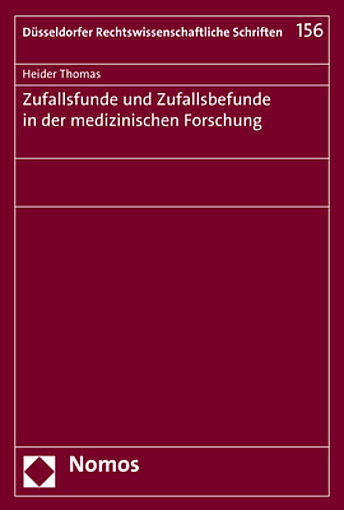englischThrough technological advancement and an increasing prevalence of biobanks, medical research is producing an increasing number of incidental findings. This dissertation in the field of medical law deals with the question of when a patient or a participant may or must be informed of these incidental anomalies with pathological relevance, and in which cases the information should be held back. The central differentiating factor is the underlying type of contract (treatment or proband contract), whereas there may also be non-contractual disclosure requirements (para. 826 of the German Civil Code, para. 323c of the German Criminal Code). There may also be authorities and obligations to inform towards third parties (e.g. Protection Against Information Act – IfSG). In case of genetic testing, the German Genetic Diagnosis Act (GenDG) must be respected; its exact scope of application with regard to therapeutic research activities is controversial. A particular focus is on the “right not to know”, whose scope and limits have not been clarified sufficiently to date.
Medizinische Forschung produziert durch technischen Fortschritt und eine steigende Verbreitung von Biobanken eine zunehmende Vielzahl von Zufallsfunden und Zufallsbefunden. Die medizinrechtliche Dissertation setzt sich mit der Frage auseinander, wann ein Patient oder Proband über diese zufällig gemachten Anomalien mit pathologischer Relevanz aufgeklärt werden darf oder muss, und wann eine Aufklärung zu unterlassen ist. Zentrales Unterscheidungsmerkmal ist dabei der zugrundeliegende Vertragstyp (Behandlungs- oder Probandenvertrag), wobei auch außervertragliche Mitteilungspflichten bestehen können (§ 826 BGB, § 323c StGB). Auch gegenüber Dritten können Aufklärungsbefugnisse und Aufklärungspflichten (bspw. IfSG) bestehen. Bei genetischen Untersuchungen ist das GenDG zu beachten, dessen genauer Anwendungsbereich bei therapeutischen Forschungsmaßnahmen umstritten ist. Besonderen Raum nimmt auch das Recht auf Nichtwissen ein, dessen Reichweite und Grenzen bis heute kaum geklärt sind.



